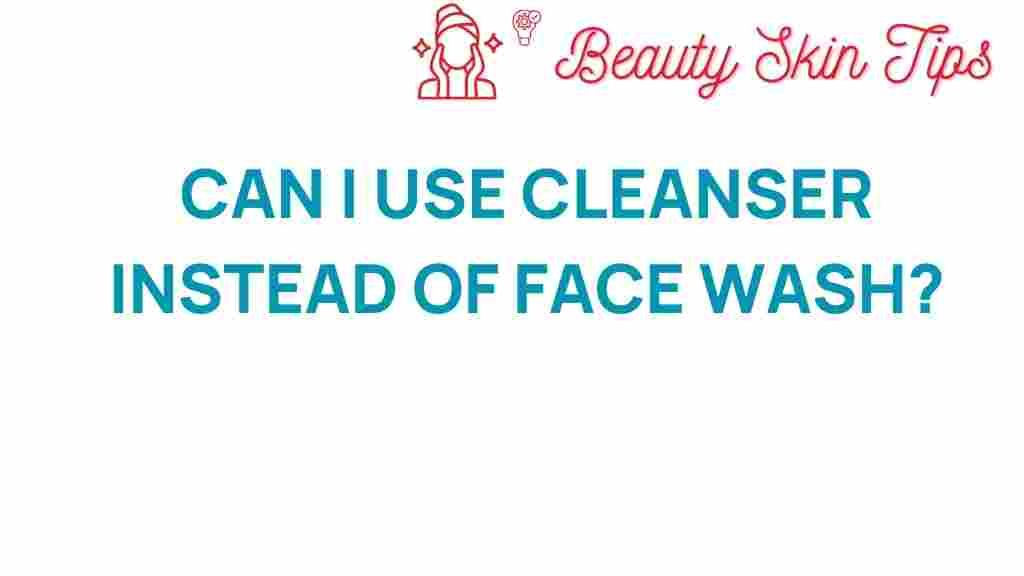Can a Cleanser Replace Your Face Wash?
The quest for flawless skin often leads us to explore various skincare products, and one common question that arises is whether a cleanser can effectively replace your traditional face wash. This debate is fueled by the myriad of cleansers available in the market, each promising to deliver unique benefits. In this article, we will delve deep into the differences between cleansers and face washes, explore their respective benefits, and provide you with a comprehensive guide to help you make the right choice for your skin type.
Understanding Cleansers and Face Washes
Before we can answer the question of whether a cleanser can replace your face wash, it’s crucial to understand what each product is and how they function.
- Cleanser: Typically designed to remove makeup, dirt, and impurities from the skin without stripping it of its natural oils. Cleansers often come in various forms, including creams, oils, gels, and balms.
- Face Wash: Generally more focused on deep cleaning the skin. Face washes often contain foaming agents and are formulated to remove excess oil and dirt, making them a popular choice for those with oily or acne-prone skin.
Benefits of Using a Cleanser
When considering whether to switch to a cleanser, it’s essential to recognize the benefits they offer:
- Gentle on Skin: Many cleansers are formulated to be gentle, making them suitable for sensitive skin types.
- Hydration: Some cleansers, especially cream-based ones, can hydrate the skin while cleansing, preventing dryness.
- Versatility: Cleansers can be used to remove makeup and can double as a treatment for various skin conditions.
- Variety: There’s a wide range of cleansers available, allowing you to choose one that best suits your skin type and concerns.
Benefits of Using a Face Wash
On the other hand, face washes also come with their set of advantages:
- Deep Cleaning: Face washes are often more effective at removing oil and impurities, making them ideal for those with oily or acne-prone skin.
- Foaming Action: The lather created by face washes can help to lift away dirt and grime more effectively.
- Exfoliation: Some face washes contain exfoliating ingredients that help to slough off dead skin cells.
- Targeted Formulations: Many face washes are designed to target specific skin concerns, such as acne, dullness, or signs of aging.
Who Should Use a Cleanser?
A cleanser can be a great option for various skin types. Here’s a breakdown:
- Sensitive Skin: If you have sensitive skin, a gentle cleanser can help remove impurities without causing irritation.
- Dry Skin: Creamy or oil-based cleansers can hydrate your skin while cleansing.
- Makeup Wearers: If you often wear makeup, a cleanser can effectively remove it without harsh scrubbing.
Who Should Use a Face Wash?
Face washes are often recommended for:
- Oily Skin: If you have oily skin, a foaming face wash can help control excess oil.
- Acne-Prone Skin: Face washes with salicylic acid or benzoyl peroxide can help treat and prevent acne.
- Active Lifestyles: If you sweat a lot or are exposed to dirt and grime, a face wash can provide a thorough cleanse.
Step-by-Step Process: How to Use a Cleanser
Switching to a cleanser from a face wash may require a slight adjustment in your routine. Here’s how to do it effectively:
- Choose the Right Cleanser: Select a cleanser that matches your skin type and addresses your specific concerns.
- Apply to Dry Skin: For oil-based or balm cleansers, apply them directly to dry skin, massaging it in to break down makeup and impurities.
- Add Water: If using a gel or cream cleanser, wet your face first. Then, apply the cleanser and massage it into your skin.
- Rinse Thoroughly: Use lukewarm water to rinse off the cleanser, ensuring that no residue is left behind.
- Follow Up: After cleansing, follow up with your skincare routine, including toner, serum, and moisturizer.
Troubleshooting Tips
While using a cleanser can be beneficial, you may encounter challenges. Here are some troubleshooting tips:
- Feeling Oily: If your skin feels oily after using a cleanser, consider switching to a gel-based option to control oil better.
- Dryness or Tightness: If your skin feels dry after cleansing, opt for a cream or oil cleanser that is more hydrating.
- Breakouts: If you experience breakouts, ensure your cleanser is non-comedogenic and suitable for acne-prone skin.
- Irritation: If you notice redness or irritation, switch to a gentler formula or consult with a dermatologist.
Conclusion: The Final Verdict
So, can a cleanser replace your face wash? The answer depends on your skin type and personal preferences. Cleansers offer gentle cleansing and hydration, making them a fantastic option for sensitive or dry skin types. In contrast, face washes provide a more thorough deep clean, making them ideal for oily or acne-prone skin.
Ultimately, the best choice lies in understanding your skin’s needs and selecting the right products accordingly. If you’re considering switching to a cleanser, start by choosing a product that fits your skin type and concerns, and don’t hesitate to experiment to find what works best for you.
For more information on skincare products, check out this detailed guide on the different types of cleansers.
Also, for expert opinions on skincare routines, visit this resource for additional insights.
This article is in the category Skincare and created by BeautySkinTips Team
